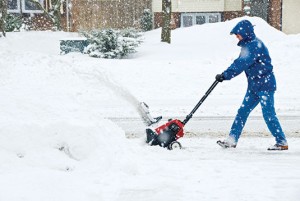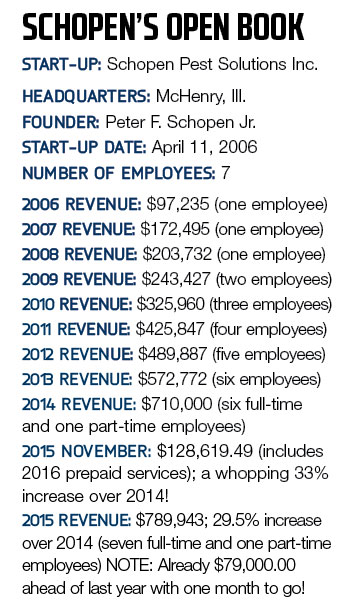
Photo: ©istock.com/Chiyacat
I grew up on a farm in Western Nebraska, way up in the high plains of the Sand Hills, just south of the Badlands. My family didn’t farm our property; we were renters. But we did live the farmers’ life: up early, to bed early and work all day.
Winters were brutal. In 1983, when I was 14 years old, the temperature stayed below zero for much of the winter. At the time, Mom had a Volkswagen Beetle that ran on diesel. The car didn’t have devices, like a block heater, to keep the diesel warm and we didn’t have a garage to shelter our cars.
So, every morning before school, I had to put on my long underwear, coveralls, scarf, thick gloves and a Chicago Bears hat, and march out across the crunching snow to my mom’s slug bug. I popped the hood, plugged in a heat lamp and an electric blanket, and sat on the engine block to get the diesel flowing. Otherwise, the fuel would be as thick as maple syrup and her car wouldn’t run.
The memory reminds me of operating a pest management company in the northern part of the United States during the winter — sluggish and slow.
Warm up the cash flow
You can’t put an electric blanket on your business. (Well, I guess you could, but it would look weird.)
Instead, many companies supplement their winter income with side jobs. The most sought-after jobs include gutter cleaning, holiday decorations, fire extinguisher inspections and vent cleaning, to name a few.
Schopen Pest Solutions takes a different tactic: We presell our summer services during the winter, including our power spray program (PSP), exterior ant treatments and Early Bird wasp treatments.
During the week leading up to Halloween and the week after, we mail out hundreds of renewal letters to anyone who bought a PSP or exterior treatment from Schopen Pest Solutions during the previous two summers. Then we quickly send out the same order forms to any wasp/stinging insect clients who used us in the past two years. By the end of November, we’ve mailed thousands of PSP letters.
We give our exterior spray clients several options. They can purchase seven treatments (April-October) all the way down to just three treatments (in April, July and October). If they prepay in November, we give them 15 percent off — 10 percent off in December and 5 percent off in January. They can pay by check or credit card.
We chose 15 percent off as our biggest discount because if someone purchases the maximum number of treatments (seven), they’re basically getting one for free. Starting at 20 percent is too much (nearly 1.5 services given away). On the other hand, starting at 10 percent isn’t enough of an incentive for most people to quickly place their orders.
During a typical year, 40 percent of our letters come back in November. Throughout December, we call clients to remind them they can still get 10 percent off if they prepay. December is a tough nut to crack, because clients are shopping for loved ones and spending money on home improvement items. Despite these barriers, we still manage to pull in another 10 percent or so of our renewal letters.
In January, things pick up a little bit even though we only offer a 5 percent discount. The holidays are over and people have a better idea of how much disposable income they have left. Again, we’ll pull in another 10 percent or so from our original base of customers.

Spring into ant season
In February, we mail out our semi-annual exterior ant treatment letters. For an average-sized home we’ll quote our clients $200 for two treatments (usually performed in May and September). We only give 10 percent off to those who prepay because it’s a lesser amount than our PSP. The ant customers seem more urgent because by then, spring is right around the corner. We usually get back about 65 percent of our letters within 30 days.
In March, we’ll call the ant treatment customers and encourage them to return their order forms. At the same time, we start mailing out Early Bird wasp letters to any stinging insect customers who decided against becoming exterior PSP clients back in November. We keep extensive lists, and check off who’s signing up for each of our various services.
This winter, we mailed out more than 750 wasp-customer exterior spray letters. Of that group, we got about 5 percent to sign up for our PSP. The remaining 95 percent will receive Early Bird wasp letters in the coming weeks, of which we might land approximately 5 percent more.
You might think the reward doesn’t match the effort it takes to switch such a small number of one-time customers over to regular service, but you must consider the renewal factor. If we mail out 750 letters, and can convert 30 of them into buying just four exterior treatments at $65 each, that is $7,800 this year — and hopefully again next year and again the year after.
We normally charge $175 for the Early Bird wasp customers. Once again, if we get 30 to switch from being one-time clients to regular annual clients, we can make an additional $5,250 per year. Even better, the number grows exponentially every year.
During March and April, we’ll continue to call last year’s exterior PSP clients, making one last push to get them signed up before we get too far into spring. All told, we expect to renew nearly 85 percent of our PSPs from year to year. Keep in mind, each summer we increase our exterior spray customer base by nearly 25 percent.
So here we are, in the middle of another cold North American winter. Schopen Pest Solutions is having an awesome off-season. Our PSP, Early Bird wasp and exterior ant treatment prepaid sales are keeping our engine warm and running steady this winter. We banked more than 12 percent of our 2015 income from prepaid sales in November and December alone.
I love having a steady income stream every month, and not just when it’s warm outside.
Schopen is owner and founder of Schopen Pest Solutions, McHenry, Ill. You can email him at pete@schopenpest.com or reach him via Twitter: @schopenpest; Instagram: @peteschopen; or Facebook: Schopen Pest Solutions, Inc.
Leave A Comment